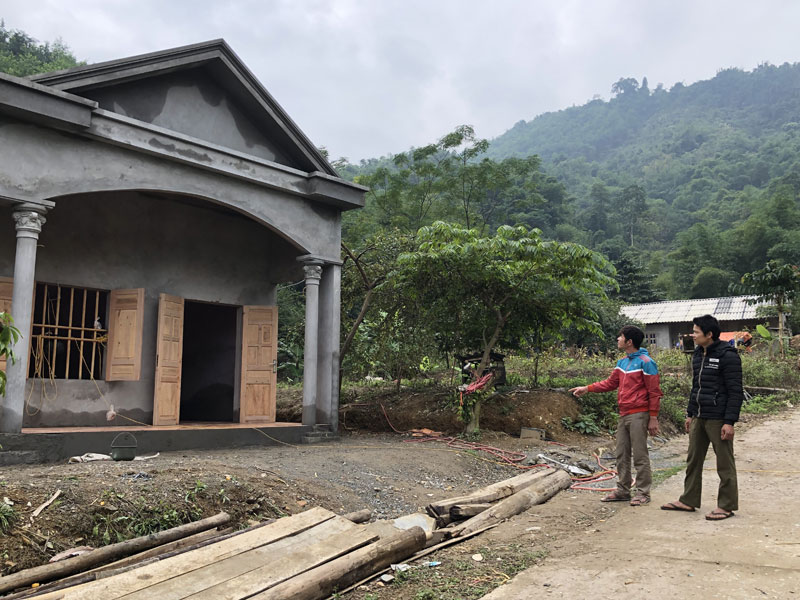
(HBO) – More than six years after moving to their new place, nearly 40 households in the resettlement area of Suoi Ke - Doi Ke in Mit villafe, Tu Ly commune of Da Bac district have gradually settled down.

Ly Van Huan's family in Mit village, Tu Ly
commune of Da Bac district has gradually settled down after more than six years
of living in Suoi Ke resettlement area.
"In the past, when I was living in Nhom
village, Dong Ruong commune, my family’s life was extremely precarious, because
it was an area at risk of landslides and flash floods in the rainy season. In
2012, with the encouragement and support of the Party and State as well as
local authorities and people, we moved to settle in the new area. Since then,
our material and spiritual lives have been getting better and better. Without
having to worry about flooding destroying our crops and house, we feel relieved
and motivated to develop production and take care of our family,” said Ly Van
Huan.
Huan’s family is one of the many households
that have increased their income in the resettlement areas. Dinh Ngoc Thai's
family with the income of over 24 million VND per year, and the family of Quach
Cong Thuan with over 60 million VND per year from pig breeding are other
examples. Since their moving in the new place, the new-comers’ life has
improved day by day. The entire residential area has been under planning, and
the main road leading to the commune concreted. Locals have accessed to clean
water, telecommunication service, and improved infrastructure works.
Ly Van Huong, head of Mit village in Tu Ly
commune said that the new residence is spacious but lacks production land.
Meanwhile, during the process of moving to the settlement area, the
compensation has yet to be completed, therefore, many households suffer a
shortage of capital to develop their production. However, locals in Doi Ke have
strived persistently to overcome difficulties. With the attention and support
of the province and local authorities, they have work hard to improve their
incomes. Some household have focused on animal husbandry and farming, while
others have developed carpentry or joined locally-based companies and
enterprises. Compared to the time they start residing in the locality, their average
per capita income have increased from 9 million VND per year to over 19 million
VND curretly./.
With just over a month left until the school summer break, students are eagerly anticipating a period of rest and fun after a year of academic pressure. To provide a healthy environment for the physical development, in addition to the classes that foster talents and enhance the academic knowledge, sports and physical activities continue to attract a large number of children and teenagers.
On April 17th, Hoa Binh Provincial Museum organized a program to promote and introduce the outstanding values of "Hoa Binh Culture” at the Boarding Secondary and High School for ethnic minority students in Mai Chau District.
The Hoa Binh College of Technical Technology, in collaboration with the Hoa Binh Technical and Economic College and the provincial Association of Literature and Arts, hosted a gathering on April 15 to celebrate Laos’ traditional Bunpimay (New Year) Festival 2025 and debut the new book "Nguoi Muong o ban Don” (Muong people in Don village).
In the millennia-long history of national construction and safeguarding, people of all ethnic groups in Hoa Binh have been united and closely bound together to overcome all difficulties and challenges, standing alongside the entire Vietnamese people throughout the history of building and defending the country.
Living green is a healthy, positive, and sustainable lifestyle that not only helps protect
the environment and quality of life but also conserves natural resources and ecosystems.
Among the many ways to embrace this lifestyle, reducing plastic consumption is one of the most impactful.
The women's unions at all levels in Kim Boi district have been making significant contributions to the movement of building cultural life in the local community.
The movement helps improve rural look and the spiritual and material lives of local residents.



